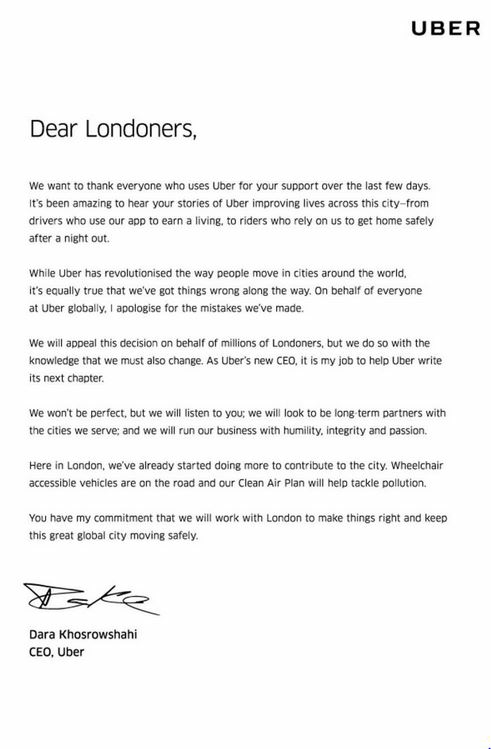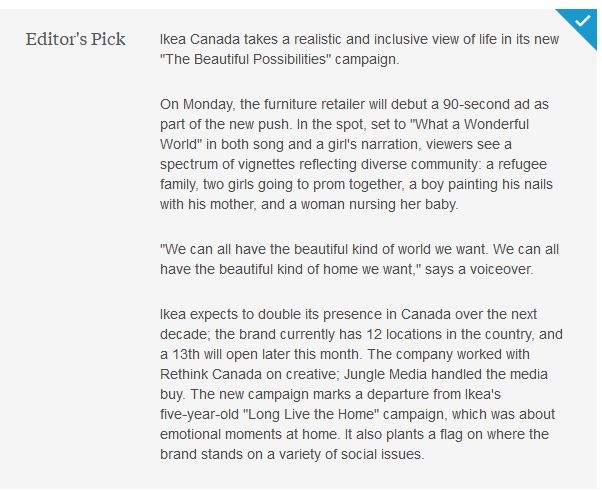President Trump's Call to a Widow
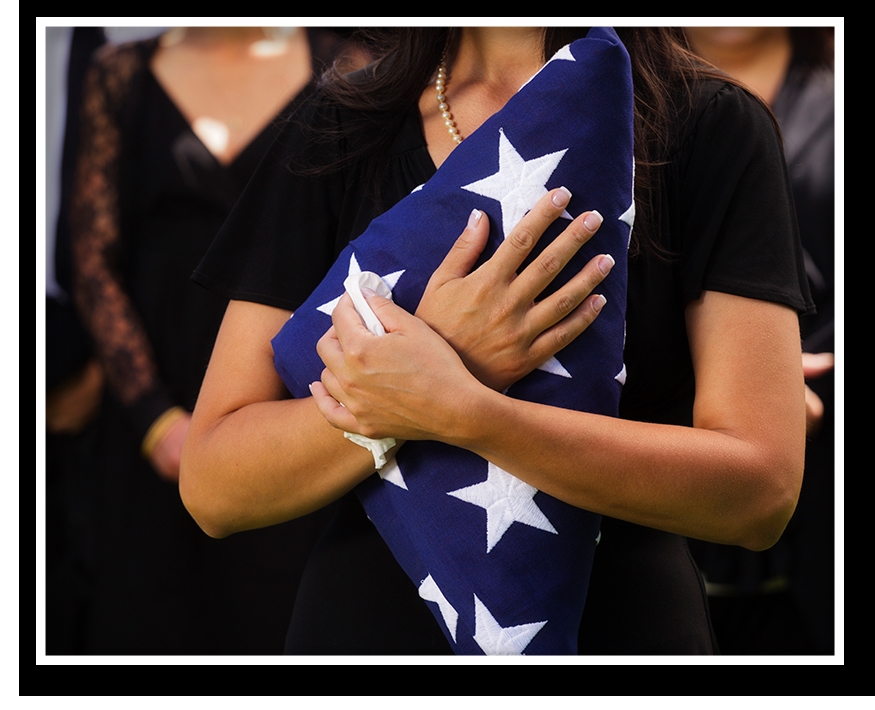 The media has covered a phone call between President Trump and Myeshia Johnson, whose husband, La David, was a soldier killed in Niger. In an interview on Good Morning America with George Stephanopoulos, Johnson describes what the president said on speakerphone in her car:
The media has covered a phone call between President Trump and Myeshia Johnson, whose husband, La David, was a soldier killed in Niger. In an interview on Good Morning America with George Stephanopoulos, Johnson describes what the president said on speakerphone in her car:
"The president said that he knew what he signed up for, but it hurts anyways. It made me cry because I was very angry at the tone of his voice and how he said it. He couldn't remember my husband's name… I heard him stumbling on trying to remember my husband's name, and that's what hurt me the most."
President Trump replied to the controversy in a tweet:
White House Chief of Staff John Kelly, who lost a son in Afghanistan, said the president had asked him, "What do I say?" when he was preparing to call four families. Kelly defended the president:
"In his way, [he] tried to express that opinion -- that (Johnson) is a brave man, a fallen hero. He knew what he was getting himself into because he enlisted. There's no reason to enlist, he enlisted. And he was where he wanted to be with exactly the people he wanted to be with when his life was taken. That was the message. That was the message that was transmitted."
Offering sympathy, as we discuss in Chapter 6 of the book, is never easy. Perhaps President Trump could have shown some vulnerability-a natural hesitation or discomfort in offering compassion.
Discussion:
- Because we don't have a recording of the interaction, it's hard for us to judge what happened. In addition, an important missing element is tone. How do you think that might have affected how the message was received?
- Other than the phone call itself, how could President Trump have handled this situation differently?
Tarantino Admits to Knowing More
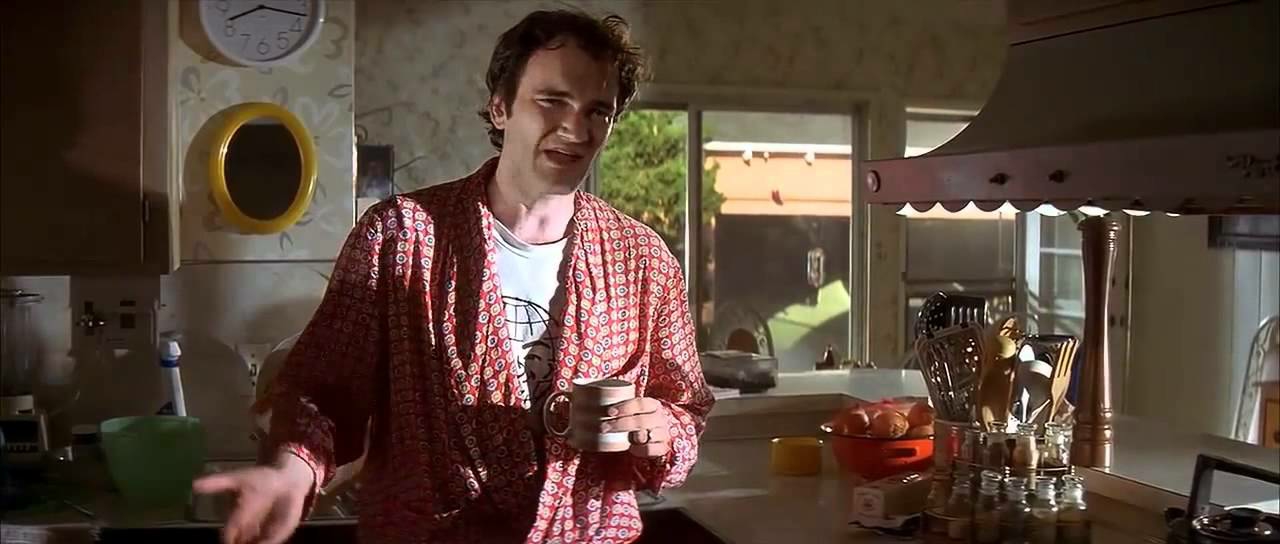 As more female victims come forward to describe Harvey Weinstein's sexual harassment behavior, one male celebrity admits to knowing and doing not enough about it at the time. Director Quentin Tarantino said, "I knew enough to do more than I did," and "There was more to it than just the normal rumors, the normal gossip. It wasn't secondhand. I knew he did a couple of these things."
As more female victims come forward to describe Harvey Weinstein's sexual harassment behavior, one male celebrity admits to knowing and doing not enough about it at the time. Director Quentin Tarantino said, "I knew enough to do more than I did," and "There was more to it than just the normal rumors, the normal gossip. It wasn't secondhand. I knew he did a couple of these things."
Tarantino cited incidents with women including his former girlfriend Mira Sorvino and also said, "I wish I had taken responsibility for what I heard," and "If I had done the work I should have done then, I would have had to not work with him."
The director regrets not seeing the larger pattern of abuse and demonstrates vulnerability when he admits, "Anything I say now will sound like a crappy excuse," and "I chalked it up to a '50s-'60s era image of a boss chasing a secretary around the desk," he said. "As if that's O.K. That's the egg on my face right now."
Unsurprisingly, Tarantino says others close to Weinstein also knew and did nothing to stop the abuse.
Above is a picture of Tarantino in the movie Pulp Fiction.
Discussion:
- What's your reaction to Tarantino's statements?
- In what ways is Tarantino demonstrating vulnerability?
- Why do you think he's coming forward now? Why haven't other Hollywood men come forward? Should they?
Harvey Weinstein's Plea
 Harvey Weinstein may have worsened his case by sending emails to friends asking for their defense. After several allegations of sexual harassment and at least two charges of assault over decades, the Hollywood producer's board of directors was getting ready to fire him from the company. Not willing to go quietly, Weinstein emailed people, including Jeffrey Katzenberg, the chairman of Walt Disney Studies. But he didn't get the response he was expecting.
Harvey Weinstein may have worsened his case by sending emails to friends asking for their defense. After several allegations of sexual harassment and at least two charges of assault over decades, the Hollywood producer's board of directors was getting ready to fire him from the company. Not willing to go quietly, Weinstein emailed people, including Jeffrey Katzenberg, the chairman of Walt Disney Studies. But he didn't get the response he was expecting.
Weinstein's email is below. He demonstrates some vulnerability but fails to take full responsibility, instead saying "a lot of the allegations are false as you know":
My board is thinking of firing me. All I'm asking, is let me take a leave of absence and get into heavy therapy and counseling. Whether it be in a facility or somewhere else, allow me to resurrect myself with a second chance. A lot of the allegations are false as you know but given therapy and counseling as other people have done, I think I'd be able to get there.
I could really use your support or just your honesty if you can't support me.
But if you can, I need you to send a letter to my private gmail address. The letter would only go to the board and no one else. We believe what the board is trying to do is not only wrong but might be illegal and would destroy the company. If you could write this letter backing me, getting me the help and time away I need, and also stating your opposition to the board firing me, it would help me a lot. I am desperate for your help. Just give me the time to have therapy. Do not let me be fired. If the industry supports me, that is all I need.
With all due respect, I need the letter today.
Instead, Katzenberg emailed Weinstein and made his response public. In part, he says, "You have done terrible things to a number of women over a period of years," yet Katzenberg calls him a friend and offers his help.
An interesting part of this story is the criticism of men who have come forward with a preface such as, "As a father of two daughters." A writer for Vulture explains this perspective.
Discussion:
- What's your view of Weinstein's letter to his friends? What other approaches could he take knowing his board is planning to fire him?
- How do you assess Katzenberg's response and his choice to make the email public? Is he a bad friend? What is he trying to accomplish for himself and for Weinstein in his response?
- Finally, what's your view of people referencing their wives and daughters? Is the Vulture writer's perspective spot on, too harsh, or something else?
Equifax Visits Congress
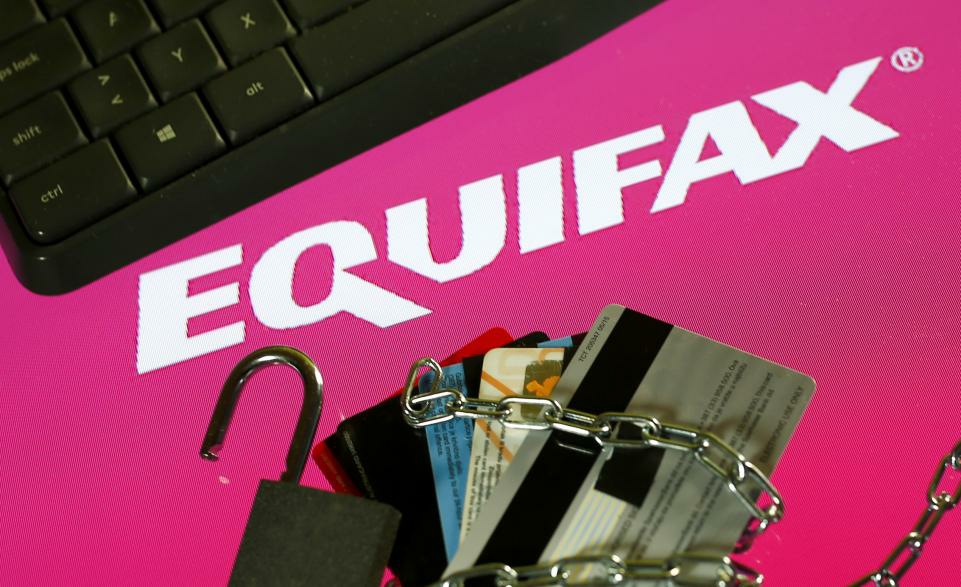 Former Equifax CEO Richard Smith admitted failures during a House Energy and Commerce Committee hearing. Smith had already apologized in a video statement, but during the hearing, he mentioned his personal accountability:
Former Equifax CEO Richard Smith admitted failures during a House Energy and Commerce Committee hearing. Smith had already apologized in a video statement, but during the hearing, he mentioned his personal accountability:
"The criminal hack happened on my watch. I am truly and deeply sorry for what happened."
Yet critics say that Equifax is still not taking full responsibility. A TechCrunch article highlights Smith's testimony blaming one person:
"The human error was that the individual who's responsible for communicating in the organization to apply the patch, did not."
The TechCrunch writer seems to think this is ridiculous:
"The notion that just one person didn't do their job and led to the biggest breach in history is quite an amazing claim and shows a fundamental lack of good security practices. But that's what Smith says led to this disaster."
Smith and Equifax's CIO retired from the company after the news became public, which took a while: executives apparently knew about a software issue back in March, but the company didn't announce the breach until September.
A Wired article cites "6 Fresh Horrors from In addition to the delayed admission, the article attack's Equifax's technology, including inadequate patching, failure to encrypt data, limited security reviews, and insufficient website capabilities.
Another twist is this case is why three top people in the company sold $1.8 million in stock around the time they would have learned of the breach. Smith denies questions of integrity:
"I've know these individual for up to 12 years. They're men of integrity. I have no indication that they had any knowledge of the breach when they made this sale."
Discussion:
- Assess Smith's testimony. What parts do you find most and least convincing?
- What else, if anything, should Equifax do now to rebuild trust?
- In what ways is this case an issue of integrity?
Miracles Happen: An Apology from Uber
 The typically non-apologetic Uber is apologizing. Two factors likely caused the company's change: 1) a new CEO, and 2) losing its operating license in London.
The typically non-apologetic Uber is apologizing. Two factors likely caused the company's change: 1) a new CEO, and 2) losing its operating license in London.
The new CEO has already demonstrated his vulnerability by talking about his emotions and showing us more of who he is as a person. An article in The Guardian explains why the city decided not to renew the company's license, which expires September 30:
TfL [Tranport for London] said last week Uber was not a "fit and proper" private car-hire operator and cited four areas of concern, including its approach to reporting criminal offences and carrying out background checks on drivers. But sources close to TfL indicated that a change of conduct from the taxi firm, the culture of which is being reformed by its new chief executive, could leave the door open to a fresh licence application.
The London decision is a blow for the ride-sharing company, and Uber is doing what it can to rebuild its image.
London Mayor Sadiq Kahn responded to the apology:
"I welcome the apology from Dara Khosrowshahi, the Uber CEO. Obviously I am pleased that he has acknowledged the issues that Uber faces in London. Even though there is a legal process in place, I have asked TfL to make themselves available to meet with him."
Discussion:
- Assess Khosrowshahi's apology. What works well, and what could be improved? (Hint: What organization principles apply?)
- What is the value of an apology? In this case, how does Uber's apology help its position with London?
President Trump Criticized for Incorrect Country Name
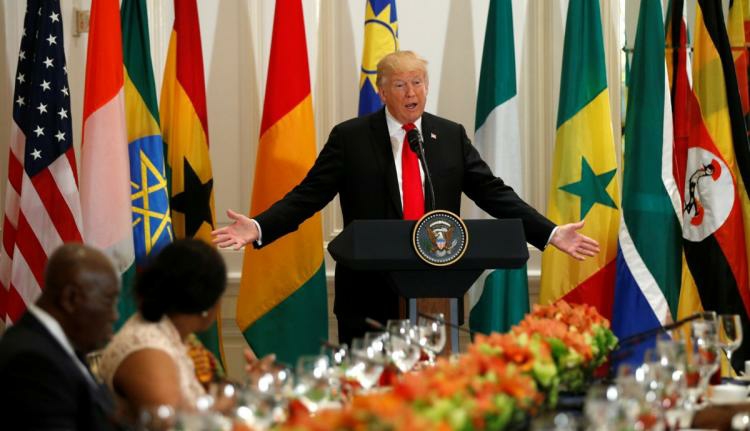 In a speech during a lunch with African leaders, President Trump mentioned the African country "Nambia," but no such country exists. Critics took to Twitter and other social sites to slam the president for "inventing" or "making up" a country. The reference in this tweet to Covfefe is a word President Trump used in a tweet earlier this year without explanation; it was likely a typo.
In a speech during a lunch with African leaders, President Trump mentioned the African country "Nambia," but no such country exists. Critics took to Twitter and other social sites to slam the president for "inventing" or "making up" a country. The reference in this tweet to Covfefe is a word President Trump used in a tweet earlier this year without explanation; it was likely a typo.
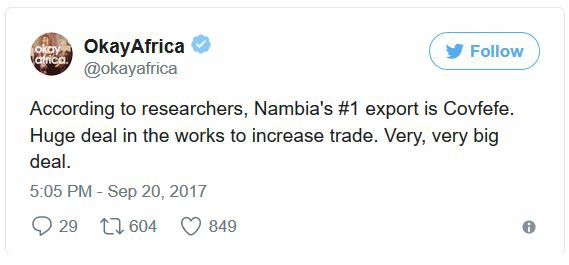 Yet the president's facts were correct for Namibia, and rather than "inventing" a country, the president likely just mispronounced its name.
Yet the president's facts were correct for Namibia, and rather than "inventing" a country, the president likely just mispronounced its name.
Critics also took issue with the president's characterization of Africa as a business opportunity: "I have so many friends going to your countries trying to get rich. I congratulate you, they're spending a lot of money."
Discussion:
- Are we too harsh? Should we overlook the mispronunciation, or should the president be more careful?
- What's your view of the president's saying Africa is a "tremendous business opportunity"?
- Should President Trump correct the mistake? How?
- How does humility factor into this situation-both the public's and President Trump's?
iPhone X Face ID Doesn't Work During Presentation
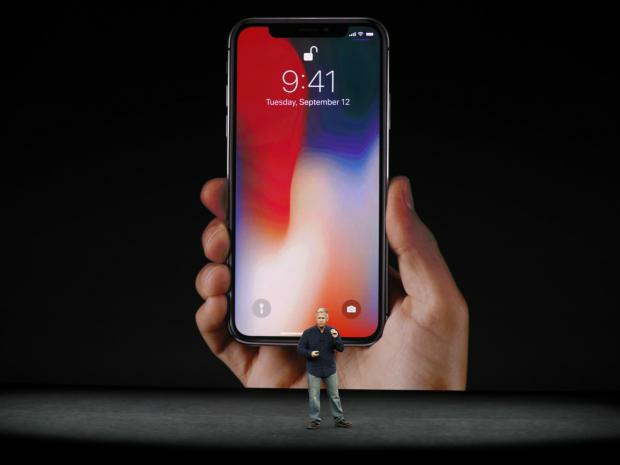 During Apple's big presentation to unveil and show features of the iPhone X, the Face ID program didn't work.
During Apple's big presentation to unveil and show features of the iPhone X, the Face ID program didn't work.
The presenter, Craig Federighi, SVP Software Development, reacted briefly when the passcode screen came up. Then he said, "Let's try that again." He picked up another device, and the feature worked.
What happened? Verge reports that it probably wasn't a problem Face ID. Rather, the passcode screen came up as a precaution just as it would on earlier versions when you restart your phone or when you haven't used it for a few hours.
Still, it was tough moment for Federighi.
Things often go wrong during presentations but, as is the case for more serious company crises, how the situation is handled is sometimes remembered more than initial issue.
Discussion:
- How well did Federighi handle the situation? What, if anything, could he have done differently?
- Apple has been quiet on the issue. Should the company explain what happened? If so, in what form, and what should they say?
- In this small moment, do we see authenticity from Federighi? What does he tell us about who he is as a person?
Ikea's Diversity Ad
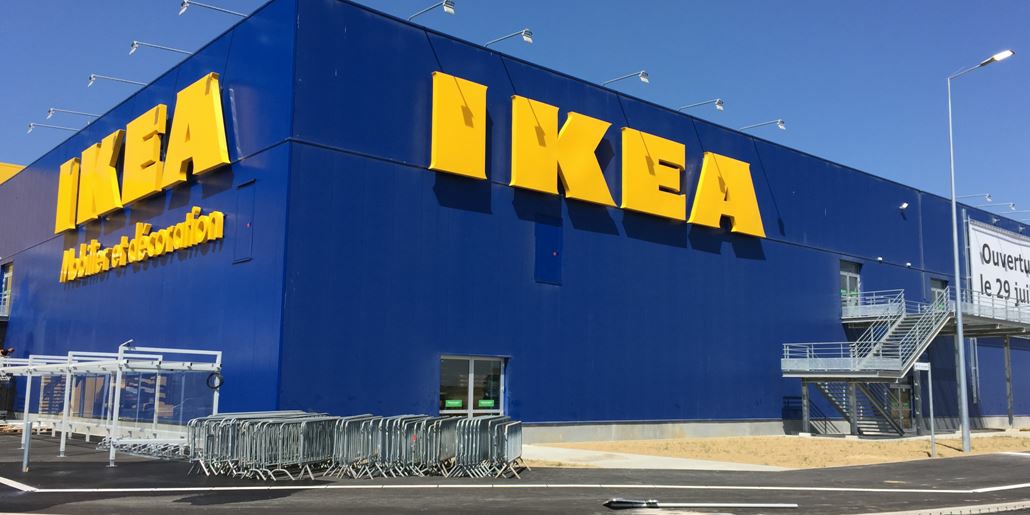 Ikea Canada is making a statement with a video set to "What a Wonderful World."
Ikea Canada is making a statement with a video set to "What a Wonderful World."
The spot starts with the song lyrics, "Seems to me, it's ain't the world that's so bad, but what we are doing to it." Then, a little girl looks out the window of a car as she narrates from the song what she sees-and we see images of different people. First up are two teenage girls exchanging corsages. Next, we see someone putting up solar panels, and then laundry drying outside.
An editor for Creativity-Online analyzes the approach. As the "Editor's Pick" states, Ikea is putting its mark on what the company deems important.
But in such a divisive political time, the ad is risky. Not everyone has the positive feelings Ikea is promoting when they see refugees or a woman breastfeeding.
- What do you think Ikea considered before producing this video? The company took some calculated risks.
- What's your view of the ad? Do you find it heartwarming, offensive, cheesy, or something else?
How Not to Apologize
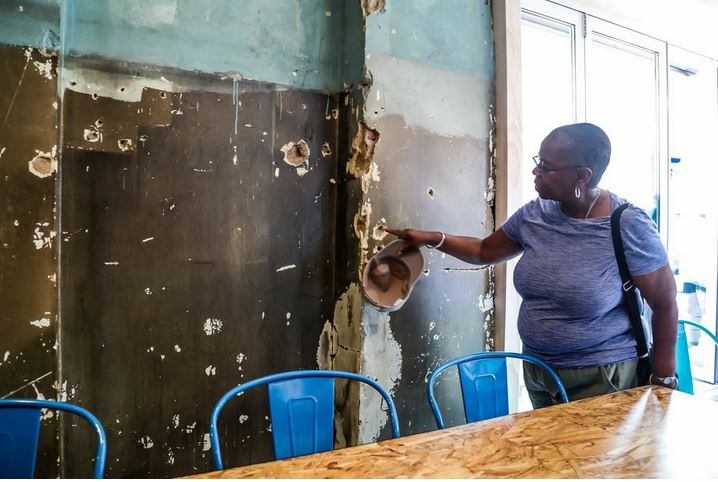 The owner of a bar in Crown Heights, Brooklyn, has faced her critics but didn't handle the apology well. Former corporate tax attorney Becca Brennan wrote a press release encouraging people to visit her new bar and photograph the wall of bullet holes.
The owner of a bar in Crown Heights, Brooklyn, has faced her critics but didn't handle the apology well. Former corporate tax attorney Becca Brennan wrote a press release encouraging people to visit her new bar and photograph the wall of bullet holes.
It was a bad joke: the holes weren't from bullets. Brennan played on previous violence in a gentrifying neighborhood. The NY Eater summarizes the issue:
Nostrand Avenue between Eastern Parkway and Atlantic is quickly gentrifying, and increasingly, bars and restaurants targeting young and primarily white new residents have opened. Summerhill may be the first business to capitalize on historic violence and poverty in Crown Heights as a point of the decor - making it an easy lightning rod for existing tensions.
Neighbors took offense, and some considered the promotion racist. Brennan issued an apology:
"I truly never meant it in that way, but I recognize that it was insensitive. I was excited to keep the wall as a shout out to the different businesses that occupied the space before us, but my intention was misinterpreted, and I'm sorry for that."
A month later, a town hall meeting was supposed to ease tensions but didn't. In response to criticism, Brennan said, "I'm sorry I have a sense of humor," and "I'm very sorry you were offended." These are classic mistakes in apology.
From her perspective, Brennan can't say anything right. She told reporters, "I mean, you see me try to talk, and nothing I say will ever be good enough." At the same time, she refuses to cover the damaged wall.
Discussion:
- What makes a good apology, and how did Brennan's fall short?
- What would you suggest for Brennan to demonstrate vulnerability?
- Should she cover the damaged wall or stick to her plan, as she says, to "keep the integrity of an 100-year-old building"?
- At this point, how, if at all, can she improve relations with neighbors?
Air Canada CEO Gets Defensive
 No one wants to face a reporter's tough questions, but it's best to handle them gracefully. Air Canada's CEO and president Calin Rovinescu got angry during an interview with a Globe and Mail reporter, and it didn't end well.
No one wants to face a reporter's tough questions, but it's best to handle them gracefully. Air Canada's CEO and president Calin Rovinescu got angry during an interview with a Globe and Mail reporter, and it didn't end well.
Rovinescu was asked about bumping a 10-year-old boy when a flight was overbooked, and he responded,
No. I'm not getting into specific customer dynamics with you, Trevor. And that's not what I expected this interview to be about, and I'm happy to end it here if that's-I'm not getting into discussions with respect to specific customer experiences.
The interviewer then asked Rovinescu about weather planning because of climate change, and he was a bit sarcastic, saying they can't do anything to control the weather. Things seem to get worse when the interviewer pushed him about an incident in July, when a plane almost collided with others on the taxiway:
Can you talk to me about pilot error? Just in terms of-
Trevor, I'm not sure I'm loving the direction of your interview here. I thought we were talking about a more generic dynamic around what the airline has achieved.
Instead, Rovinescu could have used the technique of "bridging," or transitioning from the interviewer's question to something more positive about the airline's safety record or plans for the future. He sounded defensive throughout, and the interviewer took advantage by asking tougher questions.
Rovinescu wanted to avoided seeming vulnerable-risking emotional exposure-which just made him more vulnerable and open to harm. A PR Daily article summarizes the issue well:
[Rovinescu] reacted to Cole's questions instead of answering them-and by doing so, unnecessarily increased the negative tone of the article.
Discussion:
- Read the reporter's questions. How could Rovinescu have responded to each instead?
- Did the reporter push too much? Were his questions unfair?
BMW Denies Collusion
 German automakers felt another blow this weekend when they were accused of colluding. The news came as Daimler recalls 3 million cars, and Audi recalls 850,000 to lower their emissions.
German automakers felt another blow this weekend when they were accused of colluding. The news came as Daimler recalls 3 million cars, and Audi recalls 850,000 to lower their emissions.
German officials found documents related to a potential technology cartel when looking for evidence about potential anti-trust issues related to steel. To avoid penalties, VW and Daimler admitted meeting regularly with competitors. Spiegel magazine quoted VW as saying five German carmakers met "several times a year" and had been "co-ordinating the development of their vehicles, costs, suppliers, and markets for many years, at least since the Nineties, to the present day."
One area of discussion was about the size of the technology to hold AdBlue, a chemical cleaning substance. Automakers agreed on a smaller tank to reduce costs and allow more room for accessories, such as audio, but this meant less efficient cleaning of exhaust gases.
In a statement, BMW denied the accusations:
"BMW vehicles are not manipulated and comply with respective legal requirements," and "The BMW Group categorically rejects accusations that Euro 6 vehicles sold by the company do not provide adequate exhaust gas treatment due to AdBlue tanks that are too small."
VW may have learned a lesson from the emissions scandal. A New York Times article summarizes how earlier admissions may have helped avoided trouble:
If Volkswagen had been honest with American officials [in May 2014 when Winterkorn received a memo about the inconsistent test results], the damage to the company's reputation and finances would very likely have been serious but not devastating. Similar cases suggest that Volkswagen would have paid a fine in the hundreds of millions of dollars.
Discussion:
- Assess BMW's strategy. What principles of persuasion is the company using? What crisis communication techniques would be useful to the company at this point?
- To what, specifically, is VW admitting? What, specifically, is BMW denying?
- Where's the line between meeting and collusion?
Gianforte Apologizes
Greg Gianforte, the Montana Republican candidate running for Congress, "body-slammed" a reporter. The link to audio is at right .
.
His apology letter has gotten high marks, and it does meet some of the criteria discussed in Chapter 7 for an effective apology. A professor emeritus of management and human resources at the Ohio State University's Fisher College of Business analyzed and annotated the letter for The Huffington Post:
Dear Mr. Jacobs:
I write to express my sincere apology for my conduct on the evening of May 24. My physical response to your legitimate question was unprofessional, unacceptable, and unlawful [acknowledgement of responsibility]. As both a candidate for office and a public official, I should be held to a high standard in my interactions with the press and the public [acknowledgement of responsibility]. My treatment of you did not meet that standard [expression of regret].
Notwithstanding anyone's statements to the contrary, you did not initiate any physical contact with me, and I had no right to assault you. I am sorry for what I did and the unwanted notoriety this has created for you [expression of regret]. I take full responsibility [acknowledgement of responsibility]
I understand the critical role that journalists and the media play in our society. Protections afforded to the press through the Constitution are fundamental to who we are as a nation and the way government is accountable to the people. I acknowledge that the media have an obligation to seek information. I also know that civility in our public discourse is central to a productive dialogue on issues. I had no right to respond the way I did to your legitimate question about healthcare policy [declaration of repentance]. You were doing your job.
In the hope that perhaps some good news can come of these events, I am making a $50,000 contribution to the Committee To Protect Journalists, an independent non-profit organization that promotes press freedom and that protects the rights of journalists worldwide [offer of repair].
I made a mistake and humbly ask for your forgiveness [request for forgiveness].
Sincerely,
Greg Gianforte
On Twitter, @SorryWatch also compliments the letter, but she questions the source. The letter was part of a settlement, so perhaps the words aren't Gianforte's own?
To me, the letter sounds a bit too perfect. Yes, it hits the right components but, for example, who says, "I....humbly ask for your forgiveness"? And some criteria for apologies discussed in the book are missing. It sounds like a lawyer wrote it.
Discussion:
- Quiz question: Which criteria discussed in the book are missing from this apology? These may give us a clue about how the letter falls short overall.
- What's your view of the letter? Is my assessment too harsh?
Covfefe!
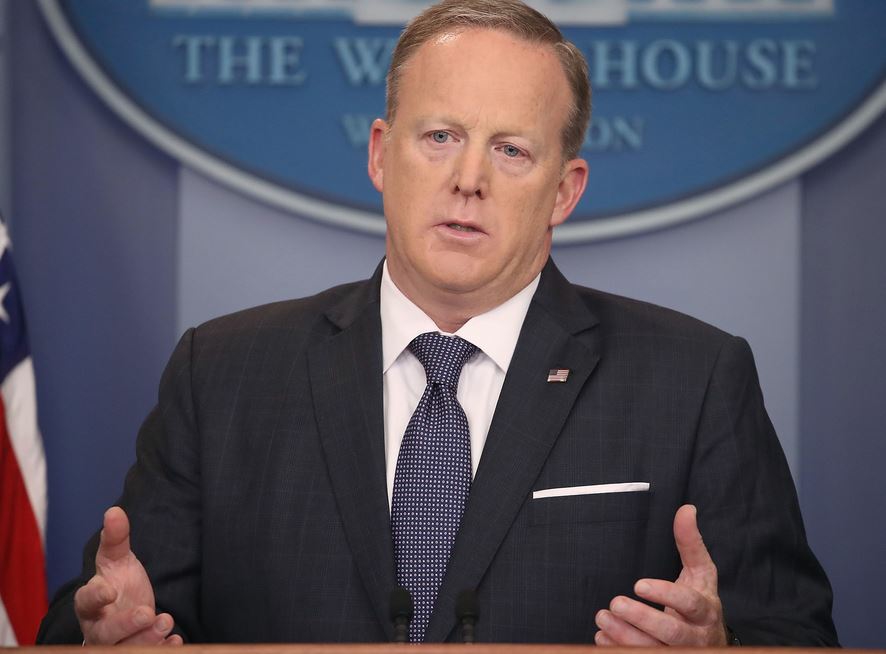 Our president will not admit a mistake. In a fit of early-morning tweeting, President Trump probably mis-typed "coverage" as "covfefe."
Our president will not admit a mistake. In a fit of early-morning tweeting, President Trump probably mis-typed "coverage" as "covfefe."
CNN editor Chris Cillizzi suggested how Sean Spicer might handle the situation when asked:
"The president made a typo. He meant to type 'coverage.' Raise your hand if you've never made a typo on Twitter."
Instead, Spicer said,
"A small group of people know exactly what he meant."
The president tweeted,
"Who can figure out the true meaning of 'covfefe' ??? Enjoy!"
The Administration's response protects the president and asserts his power: he doesn't have to apologize for anything. The tweet came amidst the president's withdrawal from the Paris Climate Accord, so the buzz didn't last long.
Discussion:
- What's your view of Sean Spicer's response?
- How about President Trump's?
- A New York Times article today says lawyers discouraging the president's tweeting. Why do you think that is? Should he follow the advice?
Dove's Shampoo Bottles Touch a Nerve
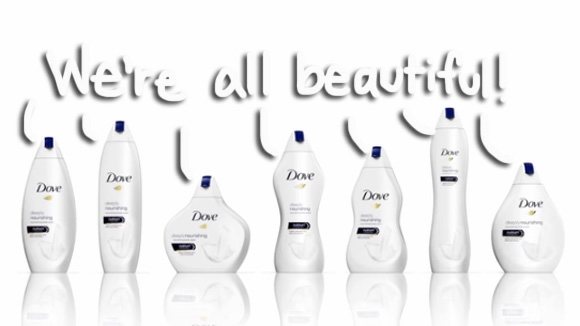 Dove's latest advertising from the "Real Beauty" campaign was mostly mocked. Shampoo bottles were designed to represent different body types, continuing with Dove's messaging about body positivity. Copy with the ad read,
Dove's latest advertising from the "Real Beauty" campaign was mostly mocked. Shampoo bottles were designed to represent different body types, continuing with Dove's messaging about body positivity. Copy with the ad read,
From curvaceous to slender, tall to petite, and whatever your skin colour, shoe size or hair type, beauty comes in a million different shapes and sizes. Our six exclusive bottle designs represent this diversity: just like women, we wanted to show that our iconic bottle can come in all shapes and sizes, too.
Twitter responses were nasty, including Perez Hilton's round-up. (Read at your own risk.)
But an AdAge article reports little brand damage. A survey of 2,200 Americans found that 41% received a more favorable view of the brand, while only 9% felt less favorable. More people were likely to buy Dove products: 71% or 3 points higher than before seeing the ads.
Discussion:
- What's your view of the campaign? Is it "dumb," as Perez Hilton says, or something else?
- How do you account for the disconnect between the nasty reaction (or should we say, the reports of the reaction) and the survey results about the brand?
- Even the most cynical seem to agree that Dove is trying to do a good thing. Does no good deed go unpunished?
Hyundai's Whistleblower
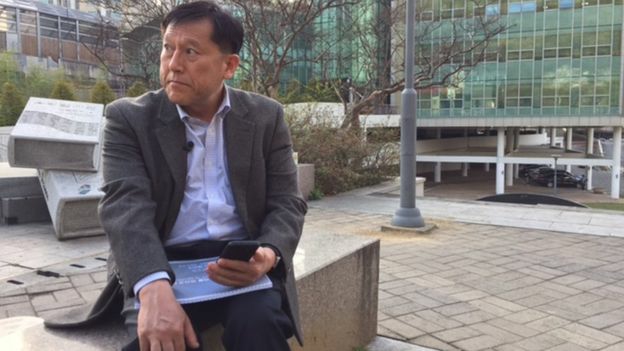 Kim Gwang-ho took a big risk revealing safety issues at Hyundai, his employer for the past 26 years. The engineer reported failures in proper engine checks that could prevent accidents. Whistleblowing is extremely rare, as Kim describes, "I will be the first and last whistleblower in South Korea's auto industry. There are just too many things to lose." He also said, "I had a normal life and was better off, but now I'm fighting against a big conglomerate."
Kim Gwang-ho took a big risk revealing safety issues at Hyundai, his employer for the past 26 years. The engineer reported failures in proper engine checks that could prevent accidents. Whistleblowing is extremely rare, as Kim describes, "I will be the first and last whistleblower in South Korea's auto industry. There are just too many things to lose." He also said, "I had a normal life and was better off, but now I'm fighting against a big conglomerate."
Hyundai denied allegations in a statement, as reported by Reuters: "The company promotes openness and transparency in all safety-related operations, and its decisions on recalls comply with both global regulators and stringent internal processes."
The company also defended its practices, arguing that they were investigating issues before Kim raised them: "Hyundai has taken appropriate steps to ensure safety, quality and compliance with applicable regulations in our markets, including all recalls Hyundai has conducted to date."
Meanwhile, investigators raided Kim's house and confiscated some documents. Kim said, "At first my wife asked me not to do it. She was worried about living costs if I'm fired. But I'm stubborn, and persuaded her that the problems will be buried forever without my confession."
But the company eventually rehired him and reimbursed him for lost work time.
Kim's complaints did inspire the South Korean government to mandate a recall-the first in the country's history. In addition to the 1.5 million cars voluntarily recalled by the Hyundai and Kia, the government requirement adds another 240,000 to the list.
Discussion:
- Analyze how Hyundai is handling this situation and the statements made so far. What could be improved?
- How believable do you find Hyundai's responses? Based on what language or other criteria are you forming your opinion?
United CEO Speaks Out
 After an insufficient apology, United CEO Oscar Munoz has changed his tune. In an interview with ABC News, Munoz said, "This first thing I think is important to say is to apologize to Dr. Dau, his family, the passengers on that flight, our customers, our employees. That is not who our family at United is. You saw us at a bad moment."
After an insufficient apology, United CEO Oscar Munoz has changed his tune. In an interview with ABC News, Munoz said, "This first thing I think is important to say is to apologize to Dr. Dau, his family, the passengers on that flight, our customers, our employees. That is not who our family at United is. You saw us at a bad moment."
Munoz also changed his view of the passenger. In a letter to employees, he seemed to blame the passenger, but in the interview, he said Dr. Dau wasn't at fault at all, although he did pause before saying so.
When asked why he didn't communicate "that shame" (he said he was "ashamed"), Munoz said he wanted to get the "facts and circumstances first." He also said his words didn't reflect what they were really feeling.
He explained that the incentive model needs to be re-evaluated because it clearly works better before people have boarded. For the future, Munoz said they will never bring a law enforcement official on a flight to remove a paying passenger again.
Discussion:
- How did Munoz do in the interview? What principles of crisis communication did he demonstrate, and where did he fall short?
- What else should Munoz have said?
- Analyze Munoz's delivery skills. How would you advise him to approach future interviews?
- Southwest and other airlines are taking full advantage of the situation. What are the potential downsides of ads like the one here?





